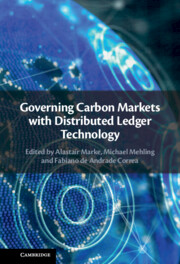
-
Select format
-
- Publisher:
- Cambridge University Press
- Publication date:
- 11 August 2022
- 25 August 2022
- ISBN:
- 9781108919166
- 9781108843560
- Dimensions:
- (229 x 152 mm)
- Weight & Pages:
- 0.46kg, 218 Pages
- Dimensions:
- Weight & Pages:
You may already have access via personal or institutional login
Book description
Carbon markets involve complex governance challenges, such as ensuring transparency of emissions, facilitating as well as recording transactions, overseeing market activity and preventing abuse. Conventionally, these have been addressed with a combination of regulatory, procedural and technical structures that impose significant burdens on market participants and administrators while remaining vulnerable to system shocks and illicit practices. Distributed Ledger Technology (DLT) has the potential to address these problems. This volume offers the first book-length exploration of how carbon markets can be governed using DLT, offering conceptual and theoretical analysis, practical case studies, and a roadmap for implementation of a DLT-based architecture in major existing and emerging carbon markets. It surveys existing expertise on distributed ledger technology, provides progress updates from industry professionals, and shows how this technology could offer a cost-effective and sustainable solution to double-counting and other governance concerns identified as major challenges in the implementation of carbon markets.
Reviews
‘A carefully researched book on carbon market mechanisms that builds on two separate research themes of legal-institutional design and emerging technologies in addressing the underlying regulatory and institutional implications. The book offers innovative and ingenious analysis by combining the two themes with practical conclusions and recommendations. Governing Carbon Markets with Distributed Ledger Technology discusses the crypto-legal structure that can support the decentralization of carbon market governance.'
Satya S. Tripathi - Secretary-General, Global Alliance for a Sustainable Planet; former United Nations Assistant Secretary General (UNEP)
‘Carbon pricing and the application of distributed ledger technology are two of the signal developments in markets today. This fascinating book investigates the potential for DLT to strengthen the governance of carbon markets and thereby contribute to meeting the urgent goals of the Paris Agreement. Offering the first ever book-length treatment of this topic, the editors have marshalled technical, legal and policy expertise that will be of equal value to scholars and practitioners.'
Stephen Minas - Chair, UNFCCC Technology Executive Committee and Associate Professor, Peking University School of Transnational Law
‘Distributed registry technologies are among the emerging solutions that have great potential to improve the transparency and development of carbon markets. This book provides an in-depth analysis of their potential to address some of the current barriers that could compromise the operationalisation of Article 6 of the Paris Agreement. The authors also examine in depth the legal and technical challenges that will need to be addressed. This is clearly a compass providing new perspectives for policy makers, regulators and climate negotiators.'
El hadji Mbaye Diagne - UNFCCC Negotiator for Carbon Markets, Senegal
‘Emerging digital technologies will definitely have transformative impacts on climate actions. Therefore, we urgently need to work together to leverage the full potentials of these technologies, and this new book shows how they can be mobilized in an important area of climate policy implementation: carbon markets. Distributed ledger technology and other innovations can play a critical role in ensuring the integrity and efficiency of carbon trading, and this timely volume – authored by an interdisciplinary team of experts – offers us a blueprint for doing so. A good read.'
Quamrul Chowdhury - Former Chair, Kyoto Protocol Joint Implementation Committee; Lead Climate Negotiator of G77 and LDCs
‘As countries strive for solutions to implement the Paris Agreement, this book proposes to exploit the potentialities of distributed ledger technologies, particularly Blockchain, to enhance transparency as well as build more resilient carbon markets.'
Ambassador Seyni Alfa Nafo - Technical Coordinator of the Africa Adaptation Initiative (AAI)
Contents
Metrics
Altmetric attention score
Full text views
Full text views help Loading metrics...
Loading metrics...
* Views captured on Cambridge Core between #date#. This data will be updated every 24 hours.
Usage data cannot currently be displayed.
Accessibility standard: Unknown
Why this information is here
This section outlines the accessibility features of this content - including support for screen readers, full keyboard navigation and high-contrast display options. This may not be relevant for you.
Accessibility Information
Accessibility compliance for the PDF of this book is currently unknown and may be updated in the future.


